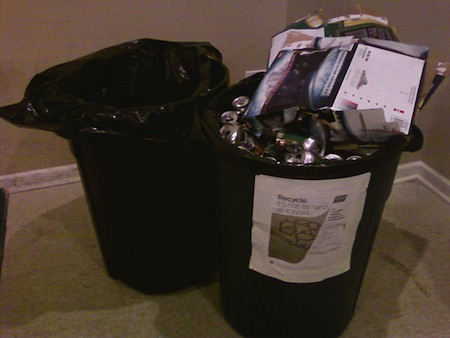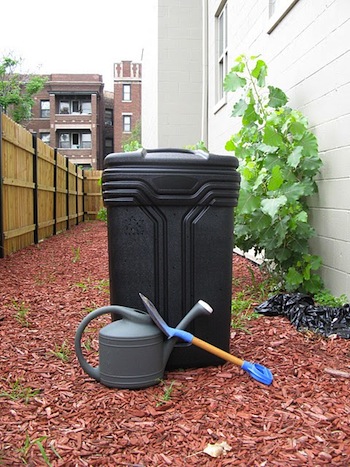Recently in Guest Posts Category
Guest post by Forrest Scofield, a first year in the College and a College Council Representative
Over the past few months, the University of Chicago has become the latest to engage in the nationwide movement to reduce bottled water consumption. Green Campus Initiative, a student run organization at the University, has been working hard to promote this reduction. Recently, GCI partnered with the Student Government Assembly to expand awareness about the issue.

Myself along with Youssef Kalad, a third year Student Government representative, drafted a resolution in support of GCI’s movement. Three weeks ago, we presented the resolution to the Assembly and listened to their concerns and suggestions regarding bottled water consumption on campus.
The discussion that ensued was lively, and many insightful and constructive comments resulted from it. Concerns were raised about the lack of sustainable alternative sources of water on campus, especially for RSOs to use at events. Bottled water’s important role in large events like convocation was also a concern. Initially several representatives opposed the wording of the resolution; some thought it lacked a sense of direction and others thought the information lacked credibility. Several graduate students discussed the disconnect between the college and the graduate schools; several hadn’t heard of the initiative previous to the presentation. The majority of the graduate representatives expressed interest in connecting their divisions to the conversation.
Two amendments were eventually added to the resolution: one that expressed Student Government’s intention to reduce the availability of funding for bottled water at student run events, and another to include the deans of the graduate divisions to the list of notable recipients.
The resolution eventually passed 14-6. The negative votes seemed to be based on the semantics of the document, but in general the intentions of the resolution received warm support from the Assembly.
With the support of the resolution in hand, I will be working closely with Green Campus Initiative, Joe Sullivan, and the Office of Sustainability to expand our effort to the graduate schools and discuss ways to provide student organizations free and sustainable water alternatives.
For further information, please check out our Facebook page or shoot me an email at fscofield@uchicago.edu.
For more, view the final resolution and the Maroon’s coverage.
Photo courtesy of UChicago Students Against Bottled Water
Once the school year began and more fraternity brothers returned to campus, I shifted my focus to fraternity-wide events like socials, parties, and the like. I often saw tons of aluminum cans and paper cartons lining the floors of rooms in which the fraternity hosted social activities, so I designated an old trash bin to be used only for recycling. I taped one of the SAGE recycling tip sheets to one side of the bin, while the other side has taped-on letters spelling "RECYCLING!". I also tried to avoid the unpleasant task of resorting recycles and non-recyclables during party clean-up shifts by placing recycling containers only where they are in highest demand. In order to avoid a space problem, I tried not to place recycling and garbage bins in the same rooms. Therefore, I placed recycling bins in the rooms where refreshments are served in recyclable containers, while I placed only garbage bins in the areas only serving refreshments in disposable cups.

As the pictures demonstrate, not only do AEPi members spend less time sorting during clean-up shifts, but, in the rooms where I provided garbage and recycling bins without compromising space, party patrons generally sorted items without issue. Even more, other AEPi members donated old towels to use as mops and cleaning rags instead of paper towels. Since O-Week when we started using the towels, we have yet to use more than 1 roll of paper towels during four different cleaning shifts that covered nearly 4,000 square-feet of space.
AEPi is committed to being a model for how other campus organizations can become more sustainable. To learn more about there efforts, contact Ari at aepstein11@uchicago.edu.
Before I became a SAGE Ambassador at the end of Spring Quarter last year, I contacted the Office of Sustainability on behalf of the Alpha Epsilon Pi (AEPi) fraternity. Because of my interest in reforming in-house and party practices to be more environmentally conscious, the fraternity elected me to institute pro-sustainability changes as co-house manager of our South Campus house.



This past Sunday, October 10, (10-10-10) was a big day for environmentalism. 10-10-10 was an international day of climate action organized by 350.org, with over 7,000 events registered in 188 countries, and the University of Chicago was part of this global call to action against climate change.
Around twenty students of the University of Chicago, primarily members of the Green Campus Initiative (GCI) and Students for a Just and Stable Future (SJSF), met at the Regenstein Library on Sunday to travel to Pilsen, a historically immigrant neighborhood of Chicago, to rally against the Fisk and Crawford Power Plants.
Students bussed and biked around the various blockades and detours in place for the Chicago Marathon that day to join around one hundred other environmentally-concerned Chicago residents in front of the Alivio Medical Center, a block from the coal-fired power plant that causes health problems and pollution in the area.
At the rally we heard speakers from various organizations including Green Peace, Physicians for Social Responsibility, the Sierra Club, and the Huffington Post, made calls to our local aldermen asking them to close down the polluting power plant, signed petitions, and added to a live art installation. We also took a picture to be featured on 350.org along with photos of thousands of other actions across the globe. As a first year I was thoroughly impressed by this event as my first environmental action in Chicago and found it very valuable to learn about one of the environmental problems in this city. It was inspiring to see people of all ages, races, and genders with a common interest in the health and future of communities that suffer from environmental degradation.
GCI and SJSF will continue to focus on the problem of coal in Chicago this year. Along with a few other RSOs, we'll be hosting a panel on coal on Tuesday, October 26, at 7 pm, in Harper 131. Please join us!
Chicago is home to a lot of great landmarks--the John Hancock building, Wrigley Field, the Bean (or Cloud Gate, if you prefer). But the Windy City also has a couple of skyscrapers that are a little less family-friendly, the Fisk and Crawford coal-fired power plants. These edifices may not be a part of the famous skyline, but they are a serious threat to the health of Chicago's residents. Built in the 1920s, they face lenient emissions standards and are the reason that Chicago now has one of the nation's highest asthma rates. In addition to chronic illness, air pollutants from Fisk and Crawford are responsible for 500 emergency room visits and 40 premature deaths each year.
Now is the time to clean up emissions from the old coal plants--not only for environmental reasons, but also for the health of Chicago residents. On Saturday, October 10, people from around the world will gather to support clean power in their communities and political action for sustainability as part of 350.org's Global Work Party. This will be the most widespread day of political action in history, with 6,227 events in 185 countries. Green Campus Initiative Students for a Just and Secure Future will be leading U of Cers downtown to join their fellow Chicagoans in demanding a cleaner, coal-free future. We'll be meeting in front of the Reg (1101 E 57th St) on Sunday, October 10 at 11:30am, to bike or take the CTA to the rally. If you need to borrow a bike, check out the UChicago bike share program.
If you have any questions, get in touch with Caroline Wooten at caroline.wooten89@gmail.com. Please come out to make the call for a clean city even louder!
--Claire Brindley
